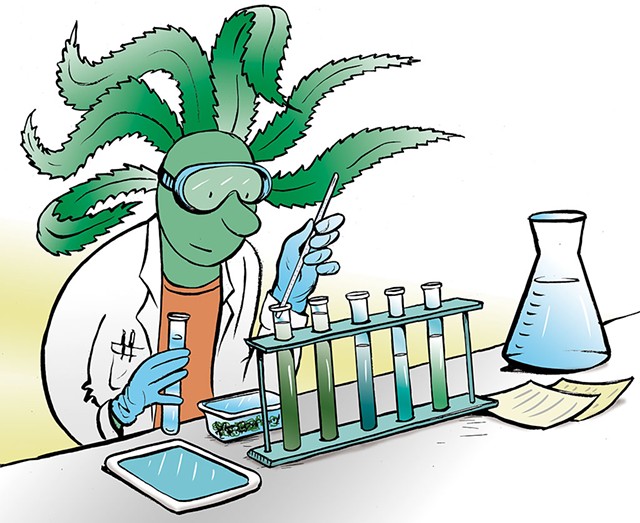
- Tim Newcomb
State regulators want to build a cannabis testing lab to help them oversee the fast-growing legal weed market.
The Vermont Cannabis Control Board's request for nearly $1 million and three new positions comes as it investigates contaminated weed that made it through several state-imposed safeguards and onto store shelves. The board pulled the pesticide-laden product, grown by Holland Cannabis, after a consumer said it made him slightly ill.
During the prolonged debate about legalizing cannabis in Vermont, advocates argued that a regulated market would be safer for consumers, who would know what they were ingesting. But just three public labs are currently licensed in the state and, until last month, only one could run all the tests required before a product can be sold. That's created a major choke point in the supply chain and put added pressure on entrepreneurs who are eager for a return on their investments.
"It's completely inoperable," said Geoffrey Pizzutillo, the cofounder and executive director of the Vermont Growers Association, which represents some 80 members. "Because testing is taking a long time, we're seeing the bad faith actors take advantage of that. And the good faith actors are saying, 'Listen, I have an agricultural commodity; it has a shelf life. The more I wait, the more the value goes down.' So it's creating a tense situation."
The legislature's budget adjustment bill, H.145, contains the money needed to fund three positions — two chemists and a lab director — and buy equipment for a new Cannabis Quality Control Program. The House and Senate approved the measure last week and sent it on to Gov. Phil Scott.
The state lab wouldn't be open to the public and, regulators acknowledge, it may not have caught the contaminated weed that made it to market. But regulators are adamant that it would help keep consumers safe by enabling the state to conduct random sampling.
"The foundation of any regulatory system is the laboratory piece," said Cary Giguere, compliance director for the Vermont Cannabis Control Board. "So, we're putting the foundation under the building now in a lot of ways."
More and more businesses are coming online in a market that, through January 31, had raised $1.67 million in state excise taxes since sales began last October. Eventually, those taxes will fund the control board, which employs about two dozen people to oversee the industry.
Because cannabis remains illegal under federal law, products can't be transported out of state, even by mail. Vermont has had to build all aspects of its market, including testing, within state lines.
Last fall, Ben Wilcox harvested outdoor-grown weed at his Off Piste Farm in Sutton. He dropped off samples at Bia Diagnostics in Colchester, which at the time was the only lab in Vermont licensed to test for pesticides. He waited some six anxiety-filled weeks for results. Had the product tested positive for some naturally occurring mold or bacteria, he could have lost his whole crop — and a paycheck he was counting on.
"I've got normal bills like everybody — mortgage payments, truck payment — and those bills keep going," he said. "And I just needed to sell some material." He added, "It's just tough to keep working full time on something with no money coming in and not knowing what these results are going to be."
Wilcox, who cleared the hurdle and has been selling his cannabis flower to retailers, doesn't blame the regulators or the lab itself, which was swamped with samples in the fall. (Bia staff said in a recent interview that wait times are now five to 10 business days.)
Another lab, Steep Hill Vermont, was recently certified to test for pesticides. But it's also located in Colchester, just across the street from Bia Diagnostics. Some Vermont growers have a long trip to either lab; Wilcox said the round trip to Bia Diagnostics takes him about four and a half hours.
"When you're really busy, that's just a chunk out of your day," he said.
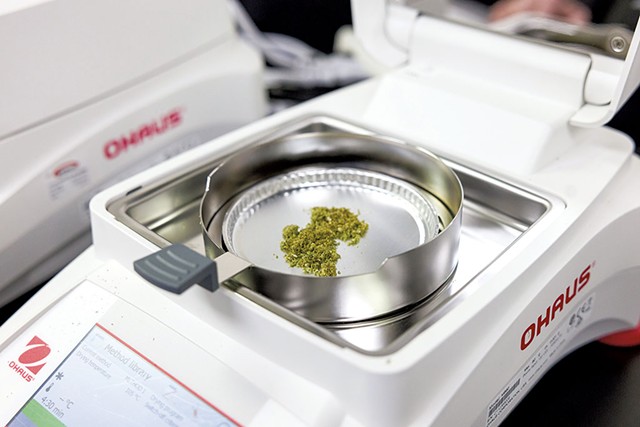
- Oliver Parini
- A moisture analyzer at Bia Diagnostics
Licensed growers, retailers and manufacturers in the state have needed to run thousands of tests so far. Demand for testing will skyrocket again in the fall as outdoor growers bring their crops to the labs.
"To open a testing facility requires a large investment and a significant amount of overhead," Wilcox said. "And it's not something that everyone can just do, and it's not something that everyone just wants to do. But I think a few more testing labs would certainly help ease the bottleneck."
While the state lab wouldn't be available to the public, at least not at first, it would allow regulators to sample products themselves to ensure producers are following the rules and that their labels, which include figures for potency, are accurate. Appearing before lawmakers on February 13, Brynn Hare, the control board's executive director, said the lab would enable the state to get results quicker and prevent its samples from gumming up the private labs that licensed growers use.
"We would be doing spot-checking not only of cultivators ... but also spot-testing product that's on the shelves," Hare said.
Members of the House Appropriations Committee seemed amenable to the request.
The testing system was built on a "trust, but verify" model, meaning growers were given the benefit of the doubt about the results of third-party labs that they submit to the state, according to Giguere. At least initially, the state was reluctant to interfere in any way that would lengthen already-long wait times.
"In hindsight, we probably should have," Giguere said.
In the meantime, without its own facility, the state recently signed contracts with the private labs for testing, and the budget adjustment bill has $100,000 for that work. The regulators hope to do as much random sampling and testing as possible with that cash.
The ultimate goal is to keep contaminated weed out of the market. The investigation into Holland Cannabis isn't complete, but regulators say more testing detected pesticides in additional samples. The biggest question for regulators is how the company was able to provide clean test results, which allowed its products — smokable cannabis flower — to make it to market.
Violations can involve fines and license suspension or revocation.
The probe has shown how expensive and time-consuming it can be to complete a forensic investigation. The board ran 35 different tests, which cost about $450 each, on Holland Cannabis samples, according to James Pepper, the board chair. That means the lab work alone cost some $16,000; the lab also had to prioritize the board's samples over growers who were in the queue.
Pizzutillo, of the growers' association, said his group generally supports the idea of state testing capacity. But he suggested that it be phased in over time, as the market is still getting started. His priority would be to shorten turnaround times at private labs.
"We're still onboarding people from the 'legacy market,'" he said, referring to growers who used to sell illicitly. "I don't know if we're ready to have the conversation about whether or not you're comfortable having someone from the state come in and sample your hash or sample your flower yet."
The control board has made it a priority to get growers who formerly grew illicitly into the regulated market. But there have been some growing pains as cultivators become acclimated to a new world of rules and regulations.
"They don't have the tools that they had previously," Giguere said. "And by tools, I mean pesticides."
The board knows of six growers whose products tested positive for pesticides but never made it to market. None was punished because each maintained it was unaware of that presence, the regulators said. They noted the system worked.
In one case, Giguere recounted, a southern Vermont grower bought clones, or cannabis starts grown from cuttings of another plant, from out of state. The test results showed that all the clones were contaminated, while the cannabis grown from seed came back clean.
Giguere said some nurseries dip plants in a pesticide called myclobutanil to protect them from disease. But contamination will show up in testing on subsequent generations of clones that come from that "mother plant."
The farmer also grows vegetables and "only uses organic practices on his property," Giguere said. "He was just as confused." The grower told a compliance officer that the contaminated weed was destroyed, according to state records.
Another grower whose weed tested positive for myclobutanil had borrowed a sprayer from someone who formerly worked in the illicit market. Giguere said even washing a sprayer won't get rid of traces of the pesticide.
In another case, a grower used PyGanic, an organic insecticide that "is not something we would allow," Giguere said. The board has a full list on its website of what is permitted, and the compliance team, which has visited every grow operation at least once, is reiterating that information, he added.
Both Giguere and Pepper said there's been some initial confusion about what is and isn't allowed. In the early days, especially, some growers were sourcing seeds and plants from less reputable sources.
That should change as the market matures. For one thing, according to Pepper, the board has asked the legislature for the authority to issue licenses to cannabis nurseries, which could sell clean clones and plants in-state.
"The growers that are in this market are happy to be here," Giguere said. "They want to be here, and they want to follow the rules. They are 100 percent behind the regulated market."

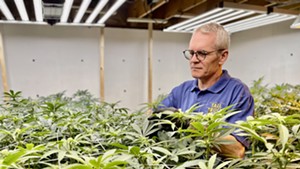
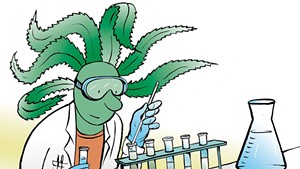
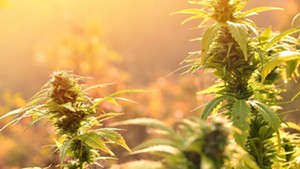








Comments
Comments are closed.
From 2014-2020, Seven Days allowed readers to comment on all stories posted on our website. While we've appreciated the suggestions and insights, right now Seven Days is prioritizing our core mission — producing high-quality, responsible local journalism — over moderating online debates between readers.
To criticize, correct or praise our reporting, please send us a letter to the editor or send us a tip. We’ll check it out and report the results.
Online comments may return when we have better tech tools for managing them. Thanks for reading.